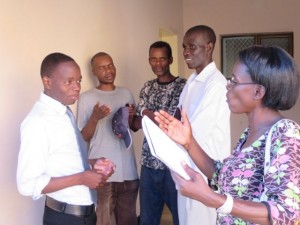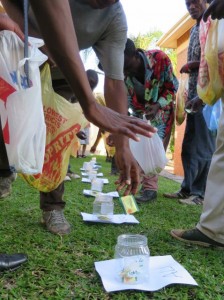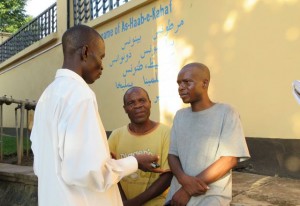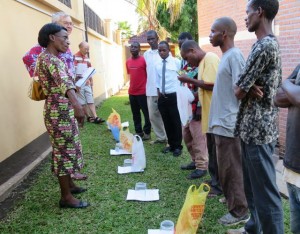
Grace clarifying the question in the first small group discussion
At change over time on Saturday, we ran a (rough) participatory budgeting workshop with the eight permanent guards for them to decide how to distribute the $550 donated by our generous neighbours and Australian friends. We designed a process for the barely literate, that is with simple instructions, little written out. Through Grace our interpreter we first asked them to discuss with each other three questions, asked sequentially: How had the big storm effected them? What would they do if they had a little bit of money to aid recovery? How would they demonstrate to each other that they had spent the money in that way?

Allocating funds with sugar sachets
After this process, we provided each with twenty sugar sachets, each worth roughly MK1200. They were to allocate these funds to each other. They were not allowed to allocate funds to themselves. However, after each distributing their 20 sachets they came to a collective realisation that this process had resulted in an uneven distribution of the funds. They demanded an opportunity to do it again. However then they realised it would always result in an uneven distribution, and as they did not want any body to be jealous, they wanted to split the funds equally. We went to great lengths to impress on them that this was their decision, not ours.
On Reflection: The designed process was OK in that they made the decision for equal allocation themselves. However I’m sure we could have designed something different that would have made them come to that decision without it being a revolution. Also even just having the names written was almost certainly too much writing for the (at least) one who was completely illiterate. (e.g.: We should have had photos).
They were all very grateful and wished to thank everyone that had helped them. They collectively decided that within the next two weeks they would each get two friends to visit them to see how they had spent the money and report back.
*Bonding capital : Everyone with similar values – see each other through good and bad times, but don’t dare be different. Linking capital: Essentially all having the same values, but able to accept some individual differences. Bridging capital: Able to acknowledge and accept those with completely different value systems to oneself.



Great idea, well done!
It’s interesting they decided to allocate the funds equally. Presumably the damage caused and the way each person was affected by the storms would be different eg. some people requiring more than others?
By allocating the funds equally, are they not still creating an uneven division because they are all starting from a different point (ie. destroyed kitchen verses lost roof etc.)?
Thanks Geoff.
A survey carried out a couple of years ago identified that in order of importance for village Malawians:
1: Enough food
2: Harmonious relationships
3: Health
4: Housing
My further reflection is that whilst the idea of adequate housing/shelter is high in our priorities, the result demonstrates just how high they value ‘harmonious relationships’.
Hi Martin, I meant to make a contribution and forgot, are you still taking them?